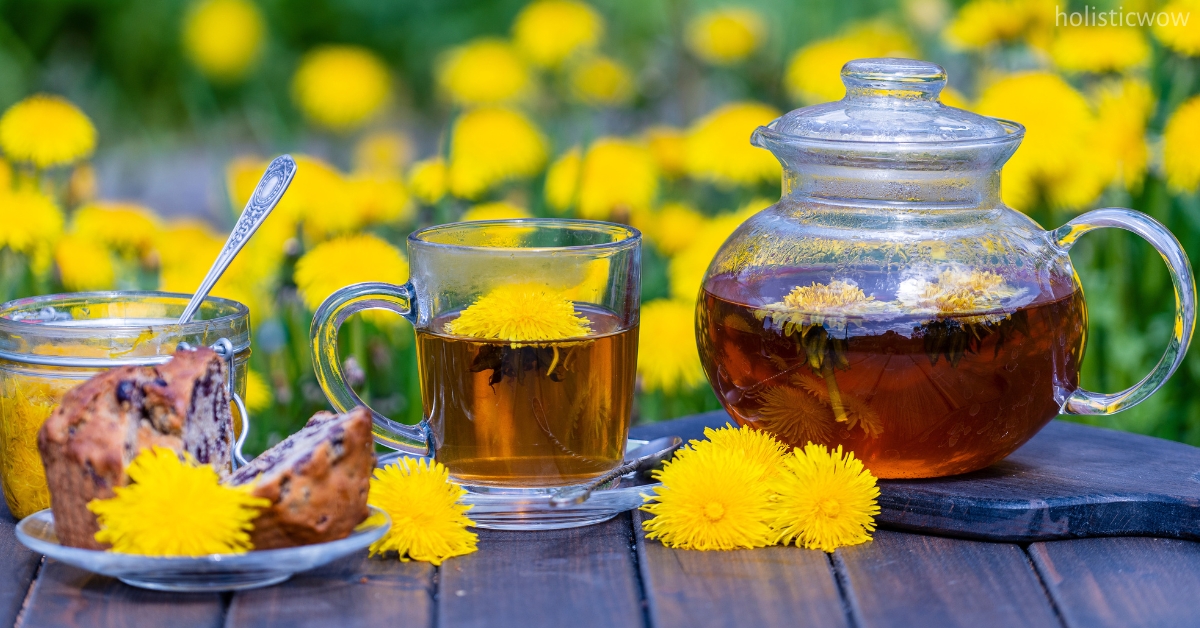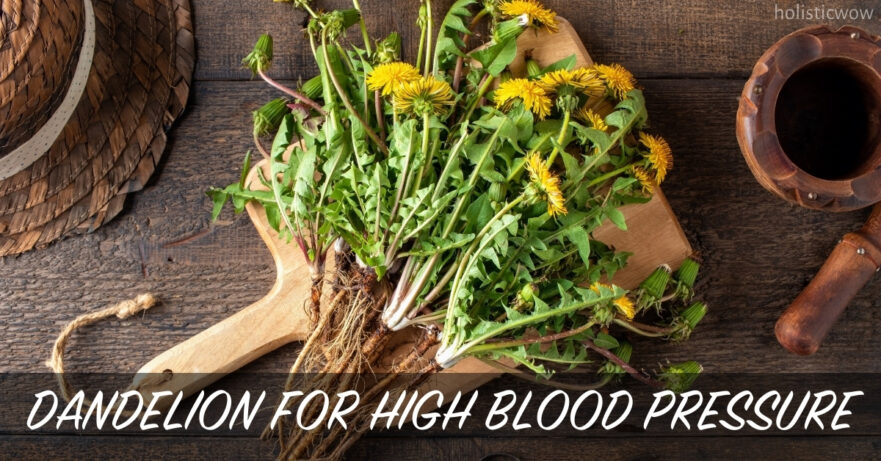What Are the Benefits of Dandelion for High Blood Pressure?
Dandelion may offer several potential benefits for individuals with high blood pressure (hypertension).
One of its key nutritional components is its high potassium content, which is known to help with blood pressure regulation by counteracting the effects of sodium and promoting the relaxation of blood vessel walls.
This mechanism may support cardiovascular health and could benefit those managing hypertension.
Additionally, dandelion contains antioxidant compounds such as beta-carotene and flavonoids. These antioxidants help reduce oxidative stress and inflammation, both of which are contributing factors to cardiovascular diseases (CVDs).
Some preliminary research also suggests that dandelion may aid in regulating cholesterol levels and supporting weight management, both of which play a role in overall heart health. However, more human research is needed to confirm these effects.
Dandelion has been traditionally used as a natural diuretic, which may help the body eliminate excess fluid and sodium, potentially contributing to lower blood pressure.
However, while these effects are biologically plausible, more well-controlled human research is needed to confirm dandelion’s role in high blood pressure management.
If you have hypertension, it’s important to consult a healthcare provider before using dandelion as a supplement.
Key Takeaways
- 🌱 Potassium Power: Dandelion is rich in potassium, which helps regulate blood pressure by counteracting sodium and promoting the relaxation of blood vessels.
- 💧 Natural Diuretic: Dandelion acts as a natural diuretic, potentially helping to eliminate excess fluid and sodium, which may contribute to lower blood pressure.
- 🛡️ Antioxidant Benefits: The antioxidants in dandelion can help reduce oxidative stress and inflammation, which are important factors in maintaining cardiovascular health.
- ⚠️ Consult Your Doctor: Before using dandelion for blood pressure management, consult with a healthcare provider, especially if you take medications, to avoid potential interactions.
How Does Dandelion Act as a Diuretic?
Dandelion acts as a natural diuretic by increasing urine production, which helps the body remove excess sodium and water.
This process may contribute to reducing fluid retention and supporting kidney function.
Dandelion’s diuretic properties may contribute to blood pressure regulation by reducing fluid retention, but more high-quality human studies are needed to confirm these effects.

What Role Does Potassium in Dandelion Play in Blood Pressure Management?
Dandelion leaves are rich in potassium, which is recognized for its role in blood pressure regulation by helping to balance sodium levels in the body.
Potassium supports the relaxation of blood vessels and the excretion of excess sodium, which can contribute to healthier blood pressure levels.
Potassium plays a key role in cardiovascular health by promoting sodium excretion through urine.
While incorporating dandelion into your diet may provide a natural source of potassium, it is essential to consult a healthcare professional for a comprehensive approach to managing high blood pressure.
How Can Dandelion’s Antioxidant Properties Affect Hypertension?
Dandelion’s antioxidant compounds may support cardiovascular health by neutralizing free radicals and reducing oxidative stress.
This plant contains antioxidants such as beta-carotene, flavonoids, and polyphenols, which may contribute to lower oxidative stress and inflammation—two factors associated with hypertension and cardiovascular diseases (CVDs).
Some research suggests that by reducing oxidative stress, dandelion’s antioxidants could contribute to better heart health and potentially support healthy blood pressure levels.
However, clinical studies in humans are necessary to confirm its direct effects on hypertension.
What Are the Potential Cardiovascular Benefits of Dandelion?
Dandelion may offer potential benefits for cardiovascular health.
Its high potassium content is known to support blood pressure regulation by helping balance sodium levels in the body.
Additionally, some animal studies suggest that dandelion may help regulate cholesterol levels and reduce inflammation, which are important factors in managing cardiovascular diseases (CVDs).
Its antioxidant properties may help protect against oxidative stress, which plays a role in heart disease.
Some preliminary studies also suggest that dandelion may have antiplatelet and anticoagulant effects, which could support heart health.
However, more clinical human trials are needed to confirm these potential benefits.

How Do Dandelion Extracts Influence Blood Flow and Kidney Function?
Dandelion extracts may influence blood flow and kidney function primarily through their diuretic properties.
As a natural diuretic, dandelion can increase urine production, helping the body eliminate excess sodium and water.
This process may contribute to reduced blood volume, potentially supporting healthy blood pressure levels.
Additionally, dandelion contains antioxidants that may help protect kidney cells by reducing oxidative stress, a factor linked to kidney damage.
While some research suggests these benefits, more human studies are needed to confirm their effects.
By aiding in removing excess substances from the body, dandelion extracts may support overall kidney function and potentially contribute to improved blood circulation, but more research is needed for confirmation.

Are There Any In Vivo or In Vitro Studies Supporting Dandelion’s Effects on Hypertension?
While research on dandelion’s direct effects on hypertension is limited, some in vitro and in vivo studies suggest that it may contribute to blood pressure regulation and support
cardiovascular health.
These studies indicate that dandelion possesses antioxidant and diuretic properties, potentially aiding blood pressure management.
However, most existing research has been conducted in laboratory or animal models, and more well-designed human trials are needed to determine its effectiveness for hypertension management.
What Are the Best Ways to Consume Dandelion for Health Benefits?
Dandelion can be enjoyed in several ways to support overall health.
- Dandelion greens are often added to salads, providing a nutrient-rich addition to meals.
- Dandelion tea, made from the plant’s leaves or roots, contains antioxidants and may support digestion, liver health, and kidney function.
- Dietary supplements offer a concentrated form of dandelion’s beneficial compounds for those looking to incorporate it into their routine.
- The root of the dandelion is sometimes roasted and used as a coffee substitute, offering a caffeine-free alternative that contains prebiotic fibers such as inulin, which may support gut health.
When consuming dandelion, it’s important to source it from areas free of pesticides or contaminants.
Additionally, consult with a healthcare provider before starting any new supplement regimen, especially if you take medications or have allergies, as dandelion can interact with certain drugs, including diuretics, anticoagulants, and medications affecting blood sugar levels.
How Can Dandelion Be Incorporated into a Diet for Blood Pressure Reduction?
Incorporating dandelion into your diet as a dietary addition for potential blood pressure regulation is simple.
Fresh dandelion leaves can be added to salads, smoothies, or soups, providing nutritional benefits such as antioxidants, fiber, and essential vitamins.
Dandelion tea is another popular way to enjoy its potential effects, as it has traditionally been used to support heart health and promote fluid balance due to its natural diuretic properties.
Dandelion extracts and supplements are available for those who prefer a concentrated form.
Including dandelion in a balanced diet rich in fruits, vegetables, and whole grains may help support overall cardiovascular health.
However, while preliminary studies suggest dandelion may have antioxidant and diuretic effects, more human clinical research is needed to confirm its direct impact on blood pres sure.
Always ensure that any dandelions used are free from pesticides, and consult with a healthcare provider before starting new supplements to avoid potential drug interactions, especially if you take medications for blood pressure, blood thinning, or diabetes.
What Are the Side Effects and Risks of Using Dandelion for Blood Pressure?
Using dandelion for blood pressure management may have potential side effects and risks.
While generally considered safe for most people, some individuals may experience allergic reactions, especially if they are sensitive to related plants.
Possible side effects include:
- gastrointestinal discomfort,
- diarrhea,
- skin reactions.
Dandelion may also interact with medications.
Its natural diuretic properties could affect fluid balance, potentially interacting with blood pressure medications.
Additionally, dandelion contains compounds that may influence blood-thinning medications, increasing the risk of drug interactions.
If you have existing health conditions or are pregnant, it is important to consult a healthcare provider before using dandelion, as research on its safety during pregnancy is insufficient.
Always seek medical advice before incorporating dandelion into your routine to ensure it is safe for your specific health needs.
Can Dandelion Interact with Blood-Thinner Medications?
Dandelion has the potential to interact with blood-thinner medications, potentially affecting blood clotting.
Its potential anticoagulant and antiplatelet activities suggest that it could enhance the effects of blood-thinning medications, increasing the risk of bleeding.
Individuals taking blood-thinner medications, including anticoagulants or antiplatelet drugs, should consult a healthcare provider before adding dandelion to their diet or supplements to avoid potential adverse interactions.
Should Dandelion Be Used During Pregnancy or for Individuals with Allergies?
Pregnant individuals should be cautious when considering the use of dandelion.
Research on its safety during pregnancy is limited , making it essential to consult a healthcare provider before using dandelion products.
Additionally, those with allergies to dandelions or related plants should avoid these products to prevent allergic reactions.
Individuals who are pregnant, breastfeeding, or have known allergies should consult a healthcare provider before using herbal supplements like dandelion.
Herbal Preparations and Recipes for High Blood Pressure
Herbal remedies can play a complementary role in supporting blood pressure management. Dandelion, known for its potassium content and mild diuretic effects, may help support cardiovascular health. However, human studies have not fully confirmed its impact on blood pressure. The following recipes utilize dandelion and other beneficial herbs traditionally used for heart health.
Always consult a healthcare provider before using herbal remedies, especially if you have existing health conditions or take medications, as interactions may occur.
Dandelion Leaf Tea for Cardiovascular Support
Ingredients:
- 1 teaspoon dried dandelion leaves
- 1 cup of boiling water
Preparation:
- Place the dried dandelion leaves in a teapot or cup.
- Pour boiling water over the leaves.
- Steep for 10 minutes.
- Strain and drink up to 1-2 cups daily.
This herbal infusion provides potassium and antioxidants, which may support cardiovascular health and fluid balance. However, its direct effects on blood pressure are not yet well-established in clinical research.
Warnings: Dandelion may interact with diuretics, blood thinners, and medications that affect electrolyte balance. Consult a healthcare provider before use if you take these medications or have kidney conditions.
Heart-Healthy Herbal Blend for Cardiovascular Support
Ingredients:
- 1 teaspoon dried dandelion leaves
- ½ teaspoon dried hawthorn berries
- ½ teaspoon dried nettle leaves
- ½ teaspoon dried chamomile flowers
- 1 cup of boiling water
Preparation:
- Combine all the dried herbs in a teapot.
- Add boiling water and steep for 15 minutes.
- Strain and drink up to 1 cup twice daily.
This herbal blend combines dandelion with hawthorn, nettle, and chamomile—each traditionally used to support heart health. Hawthorn contains flavonoids and may support cardiovascular function. Nettle is rich in nutrients, and chamomile has calming properties. Together, these herbs may support overall cardiovascular health, but more research is needed to confirm their direct effects on blood pressure regulation.
Warnings: Hawthorn may interact with blood pressure medications, beta-blockers, and heart rhythm drugs. Nettle may affect blood sugar regulation and increase the effects of blood thinners. Chamomile may interact with anticoagulants, sedatives, and anti-inflammatory drugs. Consult a healthcare provider before use if you have cardiovascular conditions, diabetes, or take prescription medications.

